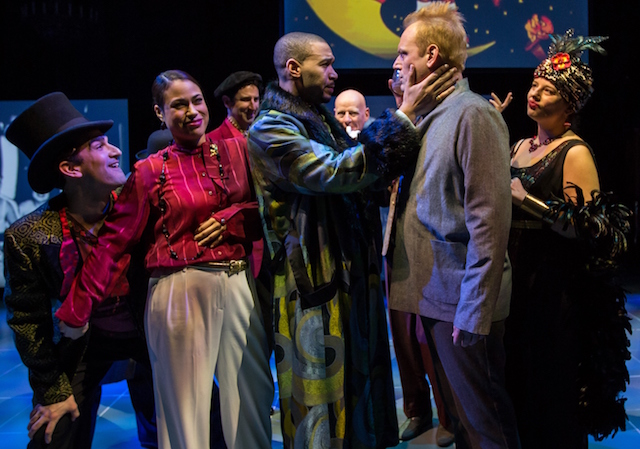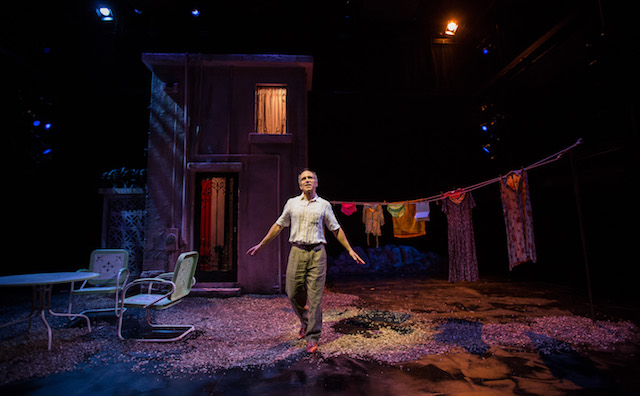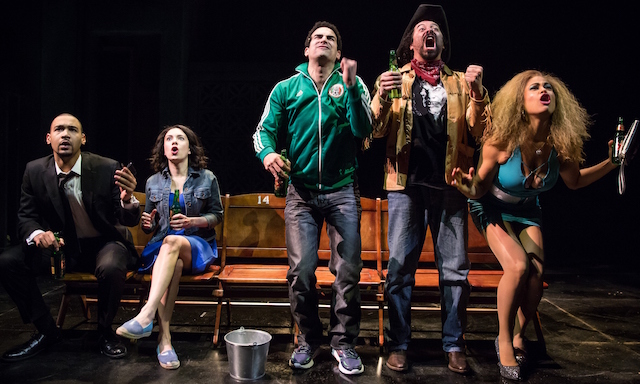At 5.5 Hours, The Goodman's '2666' Is Exhausting But Satisfying
By Tankboy in Arts & Entertainment on Feb 23, 2016 7:52PM

Demetrios Troy (Ensemble), Yadira Correa (Ensemble), Eric Lynch (Hugo), and Mark L. Montgomery (Hans) and Nicole Wiesner (Ensemble) in '2666' at Goodman Theatre.
2666, the critically-acclaimed novel from Chilean author Roberto Bolaño, clocks in at 900+ pages. Released in 2004, a year after the author's death, its story begins as a comedy based in the world of academia, then transitions into a murder mystery based in a Mexican border town. The action sprawls across multiple continents, and includes a staggeringly large cast of characters.
The search for a single, impossibly elusive character—the German writer Benno von Archimboldi—ostensibly holds the action together, but the novel was unafraid to allow its story to tumble into occasional chaos that left more questions than answers.
It seems impossible to turn such an epic into a cohesive theatrical experience. However, the production adapted by the Goodman artistic director Robert Falls and playwright Seth Bockley manages to do the book justice while also making it accessible to a general audience. Unlike the novel, you don't need to bend your brain in order to understand the story. There are still unanswered questions as the final curtain falls, but one still exits the theater feeling satisfied, if exhausted.
With a running time of 5 hours and 30 minutes, 2666 is an act of physical endurance—for the audience to watch, and for the 15-actor cast to perform. The actors take on almost 80 roles between them, jumping backward and forward in time through the inventive use of lighting and intricate, multimedia sets.
The play's five acts are broken up to mirror the novels five separate sections: "The Part about the Critics," "The Part about Amalfitano," "The Part about Fate," "The Part about the Crimes," and "The Part about Archimboldi."

Henry Godinez (Oscar Amalfitano) in “Part II: The Part About Amalfitano” of 2666 at Goodman Theatre
Throughout, the play keeps the novel's primary plot points intact. The theatrical version of 2666 begins as a comedic look at the more extreme reaches of academia, then turns into a somber look at life in fictional Mexican border town of Santa Teresa, based on the real-life Ciudad Juárez. From there, the story takes a noirish dip into Santa Teresa's underbelly and the mystery of the murders of hundreds of women. Finally, we follow one character's journey from the turn of the century through to the present, which includes his own departure for Santa Teresa.
Each cast member is called upon to play multiple characters, and we entered the play worried that this would require extensive note-taking in order to keep up. However, each actor is so talented that every character they play feels distinct, authentic and fully-formed. This applies to every character, from a sideshow magician to the larger than life Archimboldi.
The initial comedic tone helps soften the blow of some of the darkness to come. In the second act we begin to encounter despair and longing, while act three delivers a party scene—half on stage and half via a video playing over the stage—which would be best described as David Lynch meets The Blair Witch Project. As the tale of the women murdered in Santa Teresa begins to unfold, the play breaks up action worthy of a police procedural with interjections from three actors serving the function of a Greek chorus, reading off the names and method of murder of every victim.

Eric Lynch (Oscar Fate), Alejandra Escalante (Rosa Amalfitano), Demetrios Troy (Chucho Flores), Juan Francisco Villa (Charly Cruz) and Yadira Correa (Rosita Mendez) in “Part III: The Part About Fate” of 2666 at Goodman Theatre
Just as the scene seems bleakest, the final act explodes with energy, taking viewers back in time to Archimboldi's birthplace—a Prussia that evokes Alice In Wonderland, thanks to fanciful sets and costumes. Here, the show mixes all the previous acts' light and dark tones, and all their disparate storylines, into a satisfying conclusion. Not all of 2666's mysteries get solved, but we're definitely given a point of closure that doesn't feel like cheating.
Our only complaint: A few stretches of the play could be condensed. The first act runs a little too long; it feels as if the writers grew a little too fond of the humorous antics of the academics. A dinner scene in the fifth act also grows fond of its cutesier moments, when the story could have moved along more quickly.
Our final takeaway is that 2666 is a marathon ride, but one worth experiencing, especially in the hands of this outstanding cast. Just bring your own seat cushion.
2666 runs through March 20 in the Owen Theater space at The Goodman Theatre, 170 N Dearborn St. Tickets are $25 - $51.